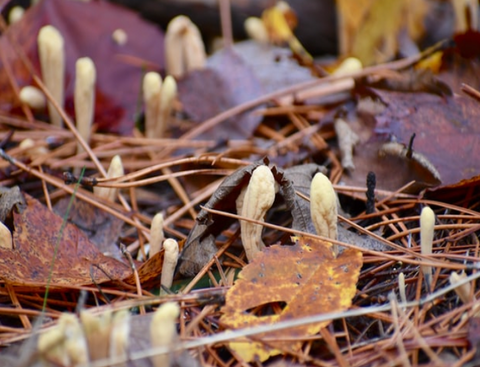The impact of stress on our lives is devastating. Many people lose concentration and experience a decline in their productivity, especially at work. Some people battle with headaches, anxiety, fatigue, low sex drive, stomach upset, and even insomnia.
Stress contributes to many diseases such as heart disease, high blood pressure, diabetes, and obesity.
Adaptogens are always mentioned alongside stress in the health and wellness industry, and there's a good reason why. You see it on juice bars, drinks, and health blogs. Doctors highly recommend them.
In this article, you’ll learn about what adaptogens are, and the top 10 adaptogenic herbs and mushrooms backed by medical science to keep you balanced.

What Are Adaptogens?
Adaptogens are highly-nutritious plants and mushrooms that help the body cope with life’s daily challenges and stress. They help improve the body’s resistance to physical, chemical, or biological stressors. Since the beginning of time, these herbs have been essential in preparing historic Chinese and Ayurvedic medicines.
Many anti-depressant and sedative supplements have one form of adaptogens in their composition. Adaptogens can be eaten raw or brewed into tea. You can add these herbs and mushrooms to your meal.
Examples of Adaptogens are: American Ginseng, Siberian Ginseng, Holy basil, Ashwagandha, Astragalus, Maca, Reishi, Goji berry, Liquorice root, Turmeric, Rhodiola Rosea/Artic root, Cordyceps, Magnolia/Schisandra berry, and Eleuthero root.
The Swedish Herbal Institute Research and Development study published in the MDPI (Multidisciplinary Digital Publishing Institute) journal reveals that adaptogens help improve cognitive performance and fight fatigue, depression, and anxiety. They also show that adaptogenic herbs enhance productivity levels and the body’s overall health.
10 Healthy Adaptogenic Herbs & Mushrooms

1) American Ginseng
American Ginseng (Panex quinquefolius) is a plant mainly grown in the eastern part of North America, but also thrives in China. The root of this plant helps tackle ingestion, fever, headache, and infertility. It is an essential component of Chinese traditional medicine. American Ginseng exists in many forms such as dried, powder, water, alcohol, tablets, and capsules. It is also available in combination with other herbs.
American Ginseng is considered an adaptogen because of its sedative and calming medicinal properties. It enhances working memory and the ability of the body to respond to stimuli. Additionally, American Ginseng enhances calmness and strengthens the body’s immune system.
A study shows that American Ginseng improves working memory, alertness, and calmness in adults.
Despite being safe, American Ginseng may have side effects like headaches, vomiting, and high blood pressure. It may also interact with some medications. If you are pregnant, on medication, or suffering from a medical, please consult with your doctor.

2) Ashwagandha
Ashwagandha (Withania Somnifera) is a plant native to India, the Middle East, and some regions in Africa. It is also known as Indian Winter cherry or Indian Ginseng. The roots of this plant possess anti-stress and anti-anxiety properties. It is a component of ancient Ayurveda medicine that popularly exists in the form of dietary supplements.
Studies demonstrate that Ashwagandha may prevent memory loss and stress-induced diseases.
Ashwagandha may cause more harm than good if taken along with other medications. It may cause side effects like diarrhoea, liver injury, high testosterone hormones, and skin burning.

3) Astragalus
Astragalus (Astragalus propinquus) is a plant native to China. It is also known as Mongolian Milkvetch. It is among the fifty essential herbs in ancient Mongolian medicine. This plant’s roots exist in different forms such as teas, supplements, capsules, liquid extracts, and powder.
This plant has immune strengthening, anti-ageing, anti-inflammatory, and anti-cancer properties. It also prevents heart and kidney diseases. Astragalus may help reduce blood sugar levels and the side effects of chemotherapy.
Astragalus is regarded as an adaptogen because of its ability to combat fatigue. Studies suggest that Astragalus may fight chronic fatigue.
Research is ongoing to determine if Astragalus is safe for pregnant or nursing women. Some species of Astragalus (not used in producing supplements) are toxic to humans. Some species contain toxic selenium levels. Astragalus may interact with immune-suppressing medications.

4) Cordyceps
Cordyceps is a species of non-toxic mushrooms. These mushrooms are widely distributed and consumed all over the world. They thrive well in tropical forests and humid temperate regions in Asia.
It's known for being very stimulating, both for improving energy and sexual performance. It does this by utilising oxygen more efficiently, and enhancing blood flow.
Studies on mice published in the PMC journal indicate that Cordyceps possesses anti-fatigue properties. Further studies on mice show that Cordyceps has anti-ageing and anti-tumour properties.
Research on diabetic mice shows that Cordyceps controls and decreases blood sugar levels. Studies on humans indicate that Cordyceps improves kidney function and exercise performance.

5) Holy Basil
Holy Basil (Ocimum tenuiflorum) is a plant that originated in India and the Southeastern part of Asia. It is also known as Tulsi or Tulasi. This plant is instrumental in the Vaishnava tradition of Hinduism. For centuries, Holy Basil has played a crucial role in the ancient traditional Ayurveda medicine because of its healing and other medical properties.
This herb has three distinct variations such as Rama or Sri Tulsi (green leaves), Khrishna or Shyama Tulsi (purple leaves), and Vana or wild/forest Tulsi (dark green leaves).
Holy Basil offers health benefits such as improving metabolism and the immune system. It prevents skin and injury infection.
Studies published in Hindawi Journal show that Holy Basil may improve mood, memory, alertness, and overall cognitive functions. Additional studies reveal that Holy basil may help with stress and anxiety.
Holy Basil has no side effects when consumed moderately. Taking an excessive amount of Holy basil can cause pregnancy and menstrual complications. It can affect fertility and reduce blood sugar to a dangerous level.

6) Maca
Maca (Lepidium Meyenii) is a native South American plant also known as Peruvian Ginseng. Andean natives have been cultivating Maca for over 2000 years. This root vegetable has been used in historic traditional medicine. The Andean natives consumed Maca as food and drink. It is available in dried, powder, and capsules forms. Today, many people add it to oatmeal, energy bars, smoothies, and baked foods.
A 2016 study on the acceptability, safety, and efficacy of Maca reveals that it's safe for consumption, and has a positive effect on mood and energy levels in the body.
Maca does not give any side effects, but pregnant or nursing mothers should see their doctor before taking Maca.

7) Magnolia & Schisandra Berry
Schisandra berry (Schisandra Chinensis) is a red fruit native to Northern China, Eastern Russia, and Korea. This fruit is also known as Magnolia berry or five-flavor fruit. Schisandra berries are part of ancient traditional medicine. The indigenous Ainu people applied this fruit to remedy cold and seasickness. It can be eaten raw or made into a drink. They are available in extracts, dried powder, elixirs, and capsules.
Magnolia berry possesses health benefits such as fighting liver and Alzheimer’s diseases. They also combat stress and depression.
Studies on mice expose that Schisandra berry positively affects stress, anxiety, and depression.
High consumption of Schisandra berry can cause heartburn, itching, and skin rash. Pregnant or breastfeeding women and people suffering from stomach-related conditions should consult a doctor.

8) Rhodiola Rosea/Artic Root
Rhodiola Rosea is a plant native to Europe and Asia’s cold and mountainous parts. It is also known as arctic root or golden root. For centuries, Russians and Scandinavians applied it to tackle stress, fatigue, and depression. It is mainly available as dietary supplements today.
Golden root offers health benefits such as enhancing learning, memory, exercise performance, and diabetes management. It also has anti-stress, anti-depressant, and anti-cancer properties.
Studies indicate that Rhodiola Rosea improves fatigue and stress symptoms.

9) Reishi
Reishi (Ganoderma lingzhi) is a non-toxic reddish-brown mushroom integral to traditional Chinese medicine. It is also known as Lingzhi. It grows on sawdust, wood logs, and grain. Companies process Reishi mushrooms into dried powder, capsules, tablets, and tea. You can also add them to a soup.
Reishi mushroom is popular because of their health benefits. They include strengthening the immune system, killing cancer cells, regulating blood sugar levels, and supporting heart health.
Studies show that Reishi mushrooms combat fatigue, anxiety, depression and improve quality of life.
Anyone suffering from a blood disorder or low blood pressure should avoid Reishi mushroom.

10) Turmeric
Turmeric is a native Indian and Southeastern Asian plant. It is a popular component of traditional ayurvedic medicine because of its medicinal properties. They are used for colouring and flavouring many dishes. They exist in powder, tea, capsules, and liquid forms.
Turmeric provides many benefits like improving the immune system, memory, and learning. It also fights against heart and Alzheimer’s diseases. It possesses anti-cancer and anti-aging properties.
Studies show that Turmeric may combat depression.
Conclusion
The adaptogenic herbs and mushrooms discussed in this article will help keep you focused, relaxed and balanced. Some of these adaptogenic can have side effects and may not be suitable for pregnant or nursing mothers. If you are on medication or suffering from a particular medical condition, please consult with your doctor. Moderation is the key to getting the best results from these herbs and mushrooms.
Sources:
https://www.mdpi.com/1424-8247/3/1/188
https://link.springer.com/article/10.1007/s00213-010-1964-y
https://www.ncbi.nlm.nih.gov/pmc/articles/PMC3252722/
https://www.nccih.nih.gov/health/astragalus
https://www.ncbi.nlm.nih.gov/pmc/articles/PMC4553310/#sec3title
https://www.ncbi.nlm.nih.gov/pmc/articles/PMC4814030/
https://www.healthline.com/nutrition/benefits-of-maca-root#4.-May-improve-mood-and-energy
https://pubmed.ncbi.nlm.nih.gov/15050427/
https://www.ncbi.nlm.nih.gov/pmc/articles/PMC5236007/
https://www.webmd.com/vitamins/ai/ingredientmono-376/schisandra
https://www.webmd.com/vitamins-and-supplements/reishi-mushroom-uses-and-risks
https://www.hindawi.com/journals/ecam/2017/9217567/
https://pubmed.ncbi.nlm.nih.gov/27548190/
https://pubmed.ncbi.nlm.nih.gov/27225351/




Comments (0)
There are no comments for this article. Be the first one to leave a message!